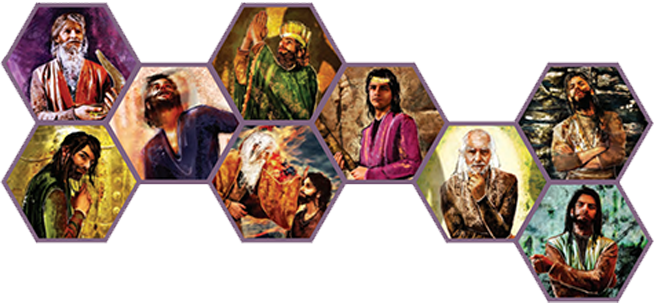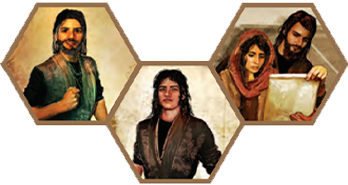
A Walk Through Salvation History
Adapted from Breakthrough! The Bible for Young Catholics.
In Genesis 1–11, the Bible begins with imaginative stories about how God created everything. These are sometimes called primeval stories, meaning they involve events that happened before recorded history. The stories of Adam and Eve, Cain and Abel, Noah and the Flood, and the Tower of Babel teach us that God created everything and that human beings have a special place in creation. They teach us that sin destroys our relationships with God and with one another, and they teach us that sin spreads, spreading death and destruction, if we are without God’s help.
Beginning in Genesis 12 and carrying through the rest of this opening book of the Pentateuch, God begins to form a special relationship with his chosen people. He makes a covenant with Abram and his wife Sarai, changing their names to Abraham and Sarah, and promising them that their descendants will be numerous and that they will one day inherit a Promised Land.
From there, we are introduced to Isaac, and later Jacob and Esau, down through Joseph, who illustrates how God continues to work in a personal way with those who love him. Despite God’s promises, though, many of Abraham and Sarah’s descendants rebelled, sinned, and committed acts of grave evil. We’re reminded when we read these ancient texts that we have always been dependent on God, and that sinfulness remains an unfortunate part of our world.
What is clear towards the end of Genesis is what will eventually lead to Jesus’ incarnation, death, and resurrection: God loves his people, even though they are prone to sin and often turn away from God. We see this as Jacob’s sons become the patriarchs of Israel, founding the Twelve Tribes, setting the foundation for Salvation History.

At the beginning of the Book of Exodus, we discover the descendants of Jacob’s children, now called Israelites, enslaved in Egypt. God hears their cries for mercy and calls Moses to lead them to freedom. Pharoah, however, through his hardness of heart, refuses to let them go. God sends upon Egypt a series of plagues, progressively more damaging, until Pharoah relents and allows the Israelites to go free. Even then, he pursues them, and God’s intervention is once again shown as Moses parts the Red Sea through the power of God’s hand.
This is the Exodus, the people of Israel’s journey to the Promised Land. Along the way, Moses is given the Ten Commandments on Mount Sinai. These commandments are an introduction to who God is, a loving God who wants his people to accept the love he has for them by following the rules laid out for living a good life. These commandments form a vital piece to the covenant given to Israel, and when the commandment to worship God alone is broken by the people, the covenant becomes broken, too. Even then, God does not abandon Israel. Instead, he uses their sin to teach them, letting them wander in the desert for 40 years, an experience that shows them just how reliant they are on God’s mercy.
Instead of leaving them to wander forever, God does bring the people to the Promised Land. However, by this time, Moses passes away.

In the books of Joshua, Judges, and Ruth, God calls another leader: Joshua. Under Joshua’s leadership, Israel must fight to gain control of the land. When they trust in God’s power, they succeed in their battles; when they lose faith, they fail. Eventually, in spite of their lack of faith at times, they gain control of the land, and each of the Twelve Tribes receives a portion.
Soon afterwards, new invaders called the Philistines try to capture the land. At this point, the Israelites have no king; God is their ruler. But God sends prophets and warriors, who are referred to as the “judges” to help deliver justice and defend the Israelites against the Philistines.

When the period of Judges has ended, Israel sees how other kingdoms are run and demands that they have a king. Here begin the Kingdoms of Judah and Israel, encompassing several books of the Bible, including 1 & 2 Samuel, 1 & 2 Kings, 1 & 2 Chronicles, Psalms, Proverbs, Isaiah, Jeremiah, Baruch, Hosea, Joel, Amos, Obadiah, Micah, Nahum, Habakkuk, and Zephaniah.
To answer the calls of Israel, God tells Samuel—the final judge—to anoint Saul as the first king of Israel. David succeeds Saul as king, and lives as a mighty warrior who unites the Twelve Tribes into one kingdom. David’s son, Solomon, builds a Temple at Jerusalem, the capital city.
After Solomon’s death, discord breaks out amongst the tribes and the kingdom splits in two: Israel in the north and Judah in the south. In the years that follow, the rules of Israel and Judah worship foreign gods and deities, they allow injustice and violence, and they constantly drift away from God’s commands.
God, once again acting in mercy and love, sends prophets like Amos, Hosea, and Isaiah to turn the people and their rulers back to him, telling them to end their worship of idols, to begin practicing justice, and to start caring for the poor and needy.
Despite all the warnings of the prophets, the people continue to turn away from God’s covenant. And, just as the tribes suffered losses in battle when they lost faith while conquering the Promised Land, the kingdoms are conquered themselves through their lack of faith in God. The Assyrians conquer Israel in 721 BC. Then, in 587 BC, the Babylonians conquer Judah. Many people are taken captive, and many more are exiled, which then becomes the term for this period in time.

The Exile of Israel and Judah is covered in the books of Ezra, Nehemiah, Tobit, Esther, 1 & 2 Maccabees, Job, Ecclesiastes, Song of Songs, Wisdom, Ben Sira, Lamentations, Ezekiel, Daniel, Jonah, Haggai, Zechariah, and Malachi. Prophets like Ezekiel bring comforting words from God, telling them the promise that God is still with them. Israel remains exiled for 50 years. Then, a new king allows them to return and to rebuild. By this time, they’re referred to as Judeans or Jews, and they begin to reestablish Jerusalem and the Temple. They see God’s hand at work, and they hope for a messiah, one to save them and return them to glory.

This leads us to the pivotal moment in Salvation History, the culmination of Scripture and the time when history changes forever: the incarnation of Jesus Christ. In the Gospels of Matthew, Mark, Luke, and John, we hear how God sent his only Son, Jesus, into the world. When Jesus is born, Israel is under Roman rule. Some Jews at the time are hoping for a mighty warrior, a messiah who will rule like David, and who would raise a mighty army to drive the Romans out. Instead, Jesus shows us a different way, preaching love, justice, and forgiveness. He heals and works miracles, showing God’s power in how he cares for the weak and the lowly.
Jesus’ followers, called disciples, come to see that he is the promised Messiah, the savior that had been promised for centuries. Jesus shows that salvation comes through faith in God and a change of heart, not through violence and political power. When the Romans kill Jesus with the approval of the Jewish leaders, his followers think that all is lost.
Instead, three days later, the Resurrection occurs: Jesus has risen from the dead!

From here to the end of the Bible, we see the establishment of the early church. The books of the Acts of the Apostles, Romans, 1 & 2 Corinthians, Galatians, Ephesians, Philippians, Colossians, 1 & 2 Thessalonians, 1 & 2 Timothy, Titus, Philemon, Hebrews, James, 1 & 2 Peter, 1, 2, & 3 John, Jude, and Revelation comprise this section of the Bible.
These books tell of the time after the Resurrection. Jesus instructs his closest followers, the Apostles, to go and spread the Good News of salvation to all people. The Holy Spirit gives them the courage to tell others about Jesus. They first preach to other Jews, and when leaders who do not believe hear what they preach, the attempt to persecute them.
One of these persecutors is Saul, who becomes known as Paul after having a vision of Jesus while on the road one day. He becomes Christian, and it’s revealed to him that Jesus came to save all people, both the Jews and non-Jews, who were referred to as Gentiles. Wherever Paul travels, he starts new Christian communities, and many of his letters to these communities are preserved in the books of the Bible. He gets assistance from many others, men and women alike, and before long Christianity spreads through the Roman Empire.
The rest, as they say, is history.
Breakthrough! The Bible for Young Catholics, NABRE Translation (Winona, MN Saint Mary’s Press, 2016). Copyright © 2016 Saint Mary’s Press. www.smp.org.

